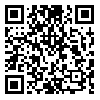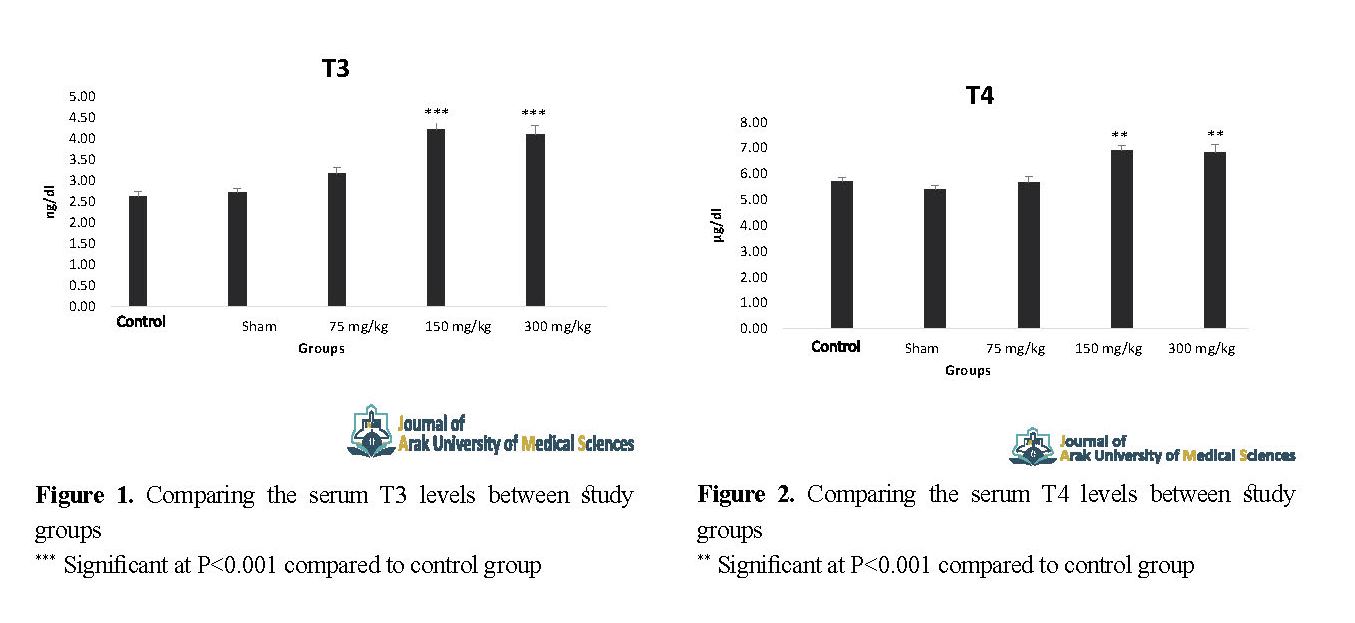Volume 22, Issue 6 (February & March 2020)
J Arak Uni Med Sci 2020, 22(6): 182-191 |
Back to browse issues page
Download citation:
BibTeX | RIS | EndNote | Medlars | ProCite | Reference Manager | RefWorks
Send citation to:



BibTeX | RIS | EndNote | Medlars | ProCite | Reference Manager | RefWorks
Send citation to:
Zabihi E, Motavallibashi S E, Panahpour1 H, Sheikhkanloui Milan H. Effect of Hydroalcoholic Extract of Truffle (Terfezia Boudieri) on Serum Level of Thyroid Hormones in Male Rats. J Arak Uni Med Sci 2020; 22 (6) :182-191
URL: http://jams.arakmu.ac.ir/article-1-6078-en.html
URL: http://jams.arakmu.ac.ir/article-1-6078-en.html
1- Department of Physiology, Faculty of Medicine, Ardabil University of Medical Sciences, Ardabil, Iran.
2- Department of Biochemistry, Faculty of Medicine, Ardabil University of Medical Sciences, Ardabil, Iran.
3- Department of Physiology, Faculty of Medicine, Ardabil University of Medical Sciences, Ardabil, Iran. , hshmilan@gmail.com
2- Department of Biochemistry, Faculty of Medicine, Ardabil University of Medical Sciences, Ardabil, Iran.
3- Department of Physiology, Faculty of Medicine, Ardabil University of Medical Sciences, Ardabil, Iran. , hshmilan@gmail.com
Full-Text [PDF 2084 kb]
(856 Downloads)
| Abstract (HTML) (2674 Views)
Full-Text: (1562 Views)
Extended Abstract
Introduction
The thyroid is a part of the endocrine system responsible for regulating important bodily functions [1]. Thyroid hormones have a special role in maintaining energy homeostasis, metabolism, stimulating cell activity and also in growth, differentiation and maturation. Mental retardation in children with thyroid hormone deficiency highlights the importance of these hormones [2]. The use of medicinal herbs in the prevention and treatment of diseases is growing today. In recent years, and in some cases, natural remedies, especially medicinal plants, have been the only treatment [6, 7]. Truffles contain flavonoids, antioxidants, vitamins, carotenoids, coumarins, and inorganic ions such as calcium, zinc, iron, copper, etc. [15-17]. In this regard, this study aimed to investigate hydroalcoholic extract of Terfezia Boudieri (TB) on serum level of thyroid hormones in male rats.
Materials and Methods
Thirty male Wistar rats (weighing 200±10 g) were prepared from the animal home of Ardabil University of Medical Sciences. Animals were maintained under controlled temperature ( 22±2°C) and a 12:12-h light:dark cycle. City water and normal diet were provided to the animals before and during the study. They were divided into five groups of 6 including control, sham (received normal saline) and three experimental groups received TB with 75, 150 and 300 mg/kg doses via intraperitoneal injection for 14 days. To obtain serum levels, blood samples were centrifuged for 5 min at 3500 rpm and then stored at -20°C. Hormone assays were measured using assay kits (MonoBind, United States) according to the manufacturer's instructions.
Results
The results of this study showed that the triiodothyronine (T3) levels in the experimental groups 2 (150 mg/kg) and 3 (300 mg/kg) increased significantly (4.22±0.17 and 4.08±0.23 ng/dl , respectively) compared to the control group (2.62±0.11 ng/dl ) (Figure 1). The thyroxine (T4) levels in these two experimental groups were also significantly increased (6.92±0.19 and 6.83±0.30 µg/dl , respectively) compared to the control group (5.72±0.13 µg/dl) (Figure 2). The Thyroid Stimulating Hormone (TSH) level in the experimental groups 1 (75 mg/kg), 2 (150 mg/kg) and 3 (300 mg/kg) decreased significantly (0.42±0.02, 0.35±0.02, and 0.39±0.01 µIU/dl, respectively) compared to the control group (0.49±0.01 µIU/dl). Comparison of experimental groups receiving different doses of hydroalcoholic extract of TB showed no significant difference in body weight.
Discussion
The present study showed that TB extract could increase serum levels of thyroid hormones (T3 and T4) without altering the weight of rats. This indicates that serum levels of thyroid hormones are probably increased by the effects of coumarin and antioxidant compounds. TB with these compounds and wide variety of antioxidants [17], may be able to increase thyroid hormones by stimulating the thyroid gland. Since TB contains minerals such as calcium, zinc, iron, etc. [17], it is likely that, by increasing calcium concentration and converting I-to I2 and eventually producing more H2O2, can increase thyroid hormone levels.
Another result of this study was a decrease in serum TSH level after using TB extract. Studies have shown that ferulic acid lowers blood sugar by raising insulin levels [25, 26] and also insulin-like growth factor 1 (IGF-1). Given that somatostatin secretion also increases under the influence of IGF-I and has an inhibitory effect on the release of thyrotropin-releasing hormones [27], and because ferulic acid is one of the active constituents of TB [15], therefore, TB may reduce TSH levels based on this mechanism. Decreased serum TSH level may also be due to negative feedback of thyroid hormones.
Ethical Considerations
Compliance with ethical guidelines
This study was approved by the Ethics Committee of the Ardabil University of Medical Sciences and has the identification Code of IR-ARUMS-RE-1396-88.
Introduction
The thyroid is a part of the endocrine system responsible for regulating important bodily functions [1]. Thyroid hormones have a special role in maintaining energy homeostasis, metabolism, stimulating cell activity and also in growth, differentiation and maturation. Mental retardation in children with thyroid hormone deficiency highlights the importance of these hormones [2]. The use of medicinal herbs in the prevention and treatment of diseases is growing today. In recent years, and in some cases, natural remedies, especially medicinal plants, have been the only treatment [6, 7]. Truffles contain flavonoids, antioxidants, vitamins, carotenoids, coumarins, and inorganic ions such as calcium, zinc, iron, copper, etc. [15-17]. In this regard, this study aimed to investigate hydroalcoholic extract of Terfezia Boudieri (TB) on serum level of thyroid hormones in male rats.
Materials and Methods
Thirty male Wistar rats (weighing 200±10 g) were prepared from the animal home of Ardabil University of Medical Sciences. Animals were maintained under controlled temperature ( 22±2°C) and a 12:12-h light:dark cycle. City water and normal diet were provided to the animals before and during the study. They were divided into five groups of 6 including control, sham (received normal saline) and three experimental groups received TB with 75, 150 and 300 mg/kg doses via intraperitoneal injection for 14 days. To obtain serum levels, blood samples were centrifuged for 5 min at 3500 rpm and then stored at -20°C. Hormone assays were measured using assay kits (MonoBind, United States) according to the manufacturer's instructions.
Results
The results of this study showed that the triiodothyronine (T3) levels in the experimental groups 2 (150 mg/kg) and 3 (300 mg/kg) increased significantly (4.22±0.17 and 4.08±0.23 ng/dl , respectively) compared to the control group (2.62±0.11 ng/dl ) (Figure 1). The thyroxine (T4) levels in these two experimental groups were also significantly increased (6.92±0.19 and 6.83±0.30 µg/dl , respectively) compared to the control group (5.72±0.13 µg/dl) (Figure 2). The Thyroid Stimulating Hormone (TSH) level in the experimental groups 1 (75 mg/kg), 2 (150 mg/kg) and 3 (300 mg/kg) decreased significantly (0.42±0.02, 0.35±0.02, and 0.39±0.01 µIU/dl, respectively) compared to the control group (0.49±0.01 µIU/dl). Comparison of experimental groups receiving different doses of hydroalcoholic extract of TB showed no significant difference in body weight.
Discussion
The present study showed that TB extract could increase serum levels of thyroid hormones (T3 and T4) without altering the weight of rats. This indicates that serum levels of thyroid hormones are probably increased by the effects of coumarin and antioxidant compounds. TB with these compounds and wide variety of antioxidants [17], may be able to increase thyroid hormones by stimulating the thyroid gland. Since TB contains minerals such as calcium, zinc, iron, etc. [17], it is likely that, by increasing calcium concentration and converting I-to I2 and eventually producing more H2O2, can increase thyroid hormone levels.
Another result of this study was a decrease in serum TSH level after using TB extract. Studies have shown that ferulic acid lowers blood sugar by raising insulin levels [25, 26] and also insulin-like growth factor 1 (IGF-1). Given that somatostatin secretion also increases under the influence of IGF-I and has an inhibitory effect on the release of thyrotropin-releasing hormones [27], and because ferulic acid is one of the active constituents of TB [15], therefore, TB may reduce TSH levels based on this mechanism. Decreased serum TSH level may also be due to negative feedback of thyroid hormones.
Ethical Considerations
Compliance with ethical guidelines
This study was approved by the Ethics Committee of the Ardabil University of Medical Sciences and has the identification Code of IR-ARUMS-RE-1396-88.
Funding
The paper was not extracted from thesis and financially supported by Ardabil University of Medical Sciences.
Authors' contributions
All authors equally contributed to paper finalization and writing.
Conflicts of interest
There was no conflict of interest among authors and related supporter.
Acknowledgements
The authors of the article thank the Vice-Chancellor of Ardabil University of Medical Sciences for financial support.
The paper was not extracted from thesis and financially supported by Ardabil University of Medical Sciences.
Authors' contributions
All authors equally contributed to paper finalization and writing.
Conflicts of interest
There was no conflict of interest among authors and related supporter.
Acknowledgements
The authors of the article thank the Vice-Chancellor of Ardabil University of Medical Sciences for financial support.
Type of Study: Original Atricle |
Subject:
Basic Sciences
Received: 2019/05/17 | Accepted: 2019/10/7
Received: 2019/05/17 | Accepted: 2019/10/7
Send email to the article author
| Rights and permissions | |
 |
This work is licensed under a Creative Commons Attribution-NonCommercial 4.0 International License. |










